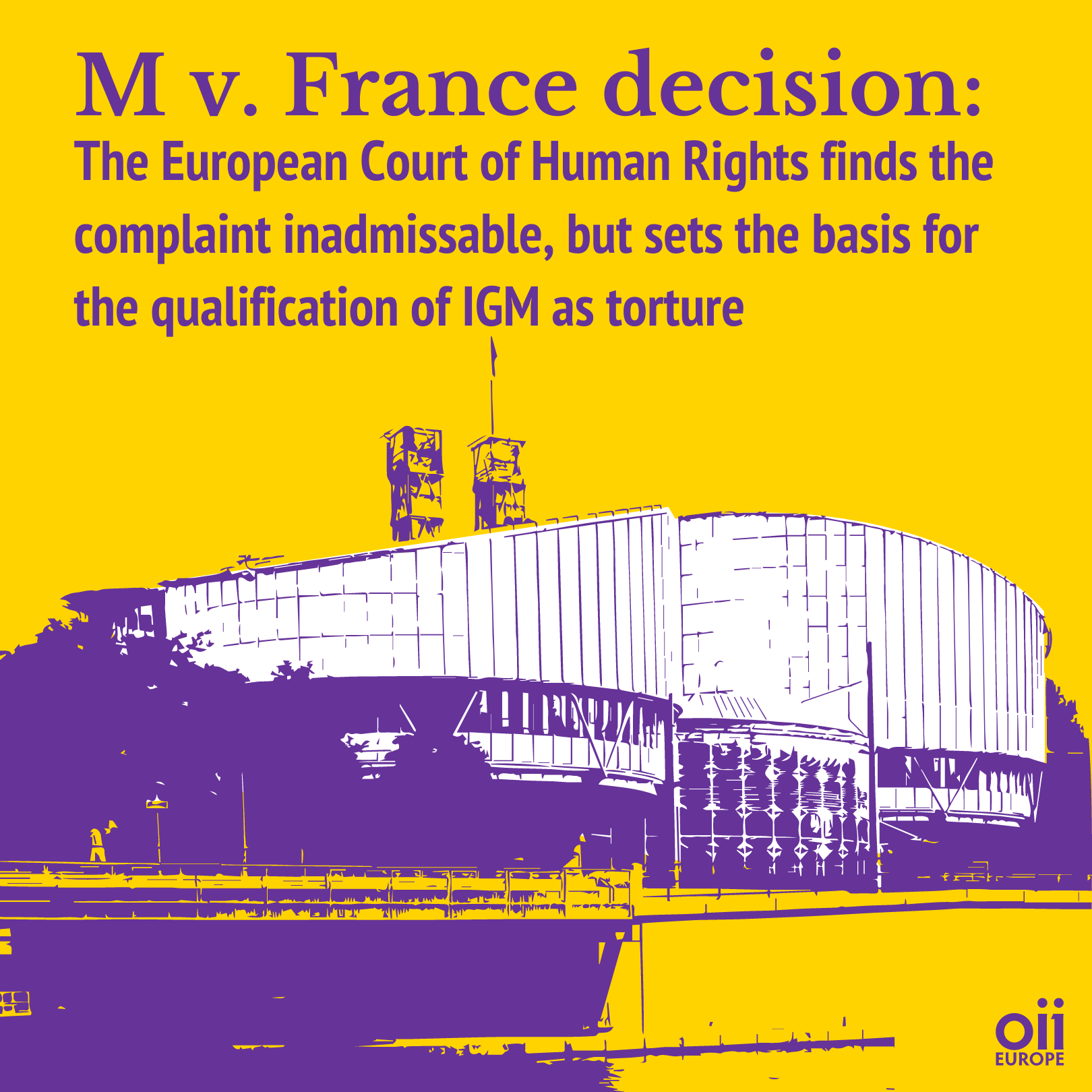The European Court of Human Rights finds the complaint inadmissable, but sets the basis for the qualification of IGM as torture
Press Release (download as PDF)
On Thursday 19 May 2022, the European Court of Human Rights communicated its decision on the case M c. France (42821/18). While the Court rejected the application on procedural grounds, it paved the way for future positive decisions on the qualification of non-vital medical interventions performed on intersex persons without their personal prior free and fully informed consent as intersex genital mutilation (IGM) and therefore as a form of torture.
The claimant had complained that the French authorities had breached the Convention in that they had refused to conduct investigation on the “sex-assignment” medical interventions the claimant had been subjected to during childhood and adolescence, without informed consent. The claimant had invoked article 3 of the Convention, which prohibits torture and inhuman and degrading treatment. The Court found the complaint under article 3 inadmissible for failure to exhaust domestic remedies, i.e. because allegedly the applicant had failed to raise this complaint before the appropriate domestic court.
Finding the complaint inadmissable means that the Court avoids deciding on the merits of the question whether non-vital medical interventions on intersex persons without their informed consent qualify as torture. However, despite leaving the question open, the Court provided several arguments in support of a positive conclusion, which appears likely to be drawn the next time a similar case is examined.
- The minimum level of severity that the ill-treatment must reach to fall under article 3 depends on various circumstances, including the “duration of the treatment and its physical or mental effects, and sometimes the sex, age and state of health of the victim” (para. 60)*.
Non-vital treatments on intersex persons are often long and of indefinite duration. They have long-lasting severe physical and psychological effects and are often performed at an early age, which increases the person’s vulnerability.
- “While the intention to injure, humiliate or belittle the victim is in principle required for treatment to fall within the scope of Article 3, the absence of such an intention does not definitively exclude it” (para. 60).
While the argument that medical doctors performing IGM do not intend to do harm is often used for opposing the qualification of such interventions as torture, the Court recalls that subjective intention is not required. The prohibition of torture is absolute and applies irrespective of the motivation of the authors. Intention may also derive from the undeniably high degree of intensity of the experienced suffering.
- “An act of a medical nature carried out without therapeutic necessity and without the informed consent of the person subjected to it is likely to constitute ill-treatment within the meaning of Article 3”. The medical necessity must be “convincingly demonstrated” (para. 62).
In the absence of any scientific evidence as to the benefits of such interventions, there is instead extensive documentation of the harm inflicted on intersex persons. Moreover, as highlighted by the French Conseil d’Etat in 2018, to establish the therapeutic purpose, suffering must indeed be experienced and expressed by the person themselves: medical necessity for non-vital treatment cannot be established without a person’s personal and fully informed consent.
- “The sterilisation of a person without a therapeutic purpose and without his or her informed consent is thus in principle incompatible with respect for human freedom and dignity and constitutes treatment contrary to Article 3 […]. The same applies to genital mutilation […] in particular when performed on a child” (para. 62).
“We applaud M. for their courage to seek justice for the violations of their bodily integrity they were subjected to”, says Kristian Randjelovic, Co-Chair of OII Europe. “IGM is a violation of the most basic values and human rights set forth in the European Convention on Human Rights.”
“While the decision denies redress to the claimant”, adds Dan Christian Ghattas, Executive Director of OII Europe, “the Court has now established the basis for qualifying non-vital interventions on intersex persons without their informed consent as a form of torture, prohibited by article 3, and this is a very important step forward”.
“Council of Europe Member States need to understand”, adds Irene Amoroso, Policy Officer at OII Europe, “that IGM is incompatible with the Convention and it must end now. OII Europe will continue to support its member organisations and allies to claim their rights”.
# END #
*All the quotes from the decision text are translated from French
Links:
Decision (this document is only available in French)
https://hudoc.echr.coe.int/eng?i=001-217430
Press Release by Collectif Intersexe Activiste – OII France
https://cia-oiifrance.org/plainte-de-mo-contre-letat-francais-la-cedh-rejette-le-recours-mais-ouvre-la-voie-a-une-future-condamnation-des-mutilations-intersexes/
Comment on the decision by Benjamin Moron-Puech
https://sexandlaw.hypotheses.org/1131


